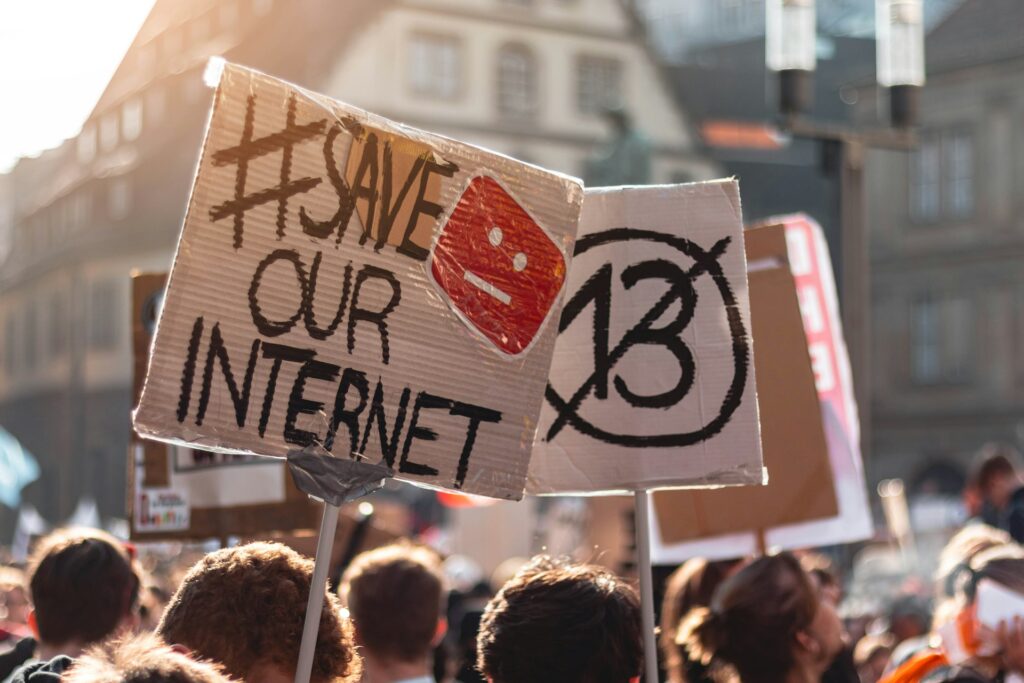Have you ever wondered what happens when democratic participation depends only on commercial tech platforms?
Whether organising community decisions in Facebook groups or running consultations via Google Forms, civil society increasingly relies on tools that were never designed for democracy.
We need small, independent tech to counterbalance the profit-over-people mindset. And participation-focused initiatives need more support now than ever, because on the contrary to big tech giants, non-profit platforms like Citizen OS don’t earn billions by selling your data.
The problem with Big Tech
Platforms like WhatsApp, Facebook, Instagram (all owned by Meta), and TikTok collect vast amounts of personal data, including browsing history, location, interactions, and even activity on third-party websites. This is a condition to use these channels for free. While they claim to protect user identities, their business model relies on monetising this data through targeted advertising.
These platforms also share data with advertisers and partners, supposedly in ways that do not directly identify users. However, concerns remain about transparency, third-party access, and potential misuse.
TikTok, in particular, has faced scrutiny due to its ties to China-based parent company ByteDance, leading to regulatory investigations and restrictions in several countries. With ongoing legal battles and shifting policies (shrinking democratic space), the commitment of these tech giants to data privacy is questionable.
Even if it’s not just about bad intentions, it’s still about business models. These platforms are optimised for engagement—not for collective decision-making or democratic discourse. And when civic initiatives try to use these spaces, new challenges appear.
Blocking legitimate civil society initiatives
Meta’s ad policies often restrict or flag ads that mention words like “democracy,” “voting,” or “elections,” even when they promote neutral civic education or public debates, which should reach a wide audience. While Meta claims this protects against misinformation and foreign interference, in practice, it often blocks legitimate civil society initiatives, making it harder for organisations to reach audiences with fact-based, democratic engagement efforts.
This creates a paradox where harmful disinformation can still spread through organic content, while well-intentioned civic campaigns face barriers, delays, or ad rejection. Many NGOs and advocacy groups must go through extra verification processes, limiting their ability to react quickly to political events. Ultimately, these restrictions can reduce public awareness, engagement, and access to balanced information, unintentionally undermining democracy rather than protecting it.
For example, even though Citizen OS is not a political organisation, using Meta’s ads is nearly impossible. Meanwhile, the platform’s algorithm increasingly prioritises paid ads. Verification is an option, but it is difficult to obtain unless you are a large organisation. So what happens to small, local initiatives?
Although these platforms are widely used for civic engagement and communication, it’s worth questioning whether they are always the best or the primary spaces for activists, civil society leaders, and communities to hold meaningful discussions and make collective decisions. They are not designed with democratic participation and common good in mind. This should keep us critical.
Do they “read” your private chats?
Of course, Meta doesn’t directly “read” your WhatsApp messages (they’re encrypted) but collects metadata—who you talk to, when, and how often. Messenger messages can be read unless you enable encryption. Even without scanning content, Meta tracks metadata across Facebook, Instagram, and WhatsApp to infer interests and show targeted ads.
If you give Meta (Facebook, Instagram, or WhatsApp) permission to access your phone’s photo and video gallery, it can collect metadata from your media. This includes:
- Location data (if GPS tagging is on, it’ll “know” exactly where you are and when)
- Timestamps (when the photo/video was taken)
- File details (size, format, and resolution)
- Device information (camera model, settings)
- Content recognition (AI scans for objects, text, faces, or themes in images)
Even if you don’t upload a photo, Meta can use this metadata for recommendations, ad targeting, and algorithmic suggestions (e.g., recognising places or products). You can limit this by restricting photo access in your phone’s app permissions.
Meta can track metadata from your other apps if you grant permissions or if those apps share data with Meta. This includes:
- App usage (which apps you open and how often)
- Device activity (battery level, network connections, storage use)
- Interaction data (buttons tapped, scrolling behavior)
It can also track your location in several ways, even if you don’t explicitly share it. Unless you restrict permissions, Meta can access where and when a photo was taken from your phone’s gallery, even if you never upload it.
Google Forms for public consultations might not be the best way
When using Google Forms, data is stored on Google’s cloud servers and governed by its privacy policies. While Google states it does not sell user data, it analyses information to enhance its services and support advertising. If a form links to Google Sheets or third-party integrations, data exposure risks increase.
The level of privacy ultimately depends on how the survey creator configures settings and whether third-party add-ons are involved. For those prioritising strict data privacy, alternative tools with stronger protection measures may be a better choice.
Google Forms lacks a feature essential for transparent consultation. When feedback is collected anonymously, only the moderator sees it. Closed forms prevent participants from viewing each other’s ideas, limiting discussion. Seeing others’ input encourages critical thinking and leads to better decisions, but usually feedback is shared only after the consultation ends—missing the chance for real dialogue.
With Citizen OS and similar participation-focused platforms, you can gather ideas, discuss pros and cons, and vote in a much more transparent way.
Tools built for profit are not designed for participation
Although these platforms are widely used for civic engagement and communication, it’s worth questioning whether they are always the best or the primary spaces for activists, civil society leaders, and communities to hold meaningful discussions and make collective decisions.
They are not designed with democratic participation and common good in mind. This should keep us critical.
Citizen OS – non-Profit, ad-Free, open Source, and secure
With the Citizen OS participation platform, we prioritise user privacy and data security. We do not sell, rent, trade, or transfer personal data to third parties. Any data sharing is strictly for essential services, such as Mobile-ID login, which enhances usability without benefiting us financially. Mobile-ID is a trusted, optional login method.
Try Citizen OS now!
Make smarter decisions on our free, open-source participation platform.
Privacy-friendly analytics
Unlike Google Analytics, Plausible does not track individual users, ensuring that no personal data is linked to specific individuals. Plausible is made and hosted in the EU with their legal entity incorporated in Estonia.
“We believe excessive data collection is unethical and unnecessary, which is why we don’t use Google Analytics,” explains Sara Sinha, QA Engineer at Citizen OS.
Citizen OS collects only aggregated and anonymised data using Plausible, a privacy-friendly analytics tool. This includes unique visitor counts, referral sources, top pages, and country-level data—without tracking detailed user behaviour or storing IP addresses. While Google Analytics offers more detailed insights, it comes at the cost of user privacy.
“Although Google must request consent under GDPR, we see no reason to collect such detailed information. We treat our users the way we would like to be treated—free from unnecessary tracking. Collecting personal data increases risks, such as phishing attacks and data breaches, which we actively work to prevent,” Sinha adds.
Plausible provides valuable insights while respecting privacy. It operates without cookies, does not track personally identifiable information, and fully complies with GDPR, CCPA, and PECR. Unlike Google Analytics, which dominates web tracking and fuels one of the world’s largest advertising networks, Plausible supports independent developers and ethical data practices.
Why use Citizen OS?
Citizen OS requires users to create an account to foster accountability and a safe discussion environment. This aligns with our mission to encourage respectful engagement and discourage harmful, anonymous content.
“If users log in via Facebook or Google, those platforms share limited data with Citizen OS—not the other way around. We use Heroku, whose platform is built for security from the ground up in compliance with key industry standards for data protection,” explains Sinha.
“As an analyst, I cannot link data to specific users. We collect only what is legally required and never use user emails for marketing or sales. Many platforms exploit personal data for profit—Citizen OS does not. We genuinely care about privacy and safeguarding our users’ data,” she concludes.
At Citizen OS, privacy is more than a policy—it’s a fundamental principle that shapes everything we do.
Help us to keep the participation platform free!
The reality is this: funding for civil society is shrinking, and civic space is under pressure globally. This trend has also impacted Citizen OS and other independent platforms.
Keeping the platform free for everyone requires support from people who believe in democracy. If you want to help protect civic space, empower participation, and keep small tech alive, consider donating to Citizen OS.
Your contribution helps keep the platform open, neutral, and accessible to communities everywhere—no matter their size or budget.
Support Citizen OS by donating, sharing your expertise, or volunteering. Together, let’s build technology that serves democracy—not the other way around.



